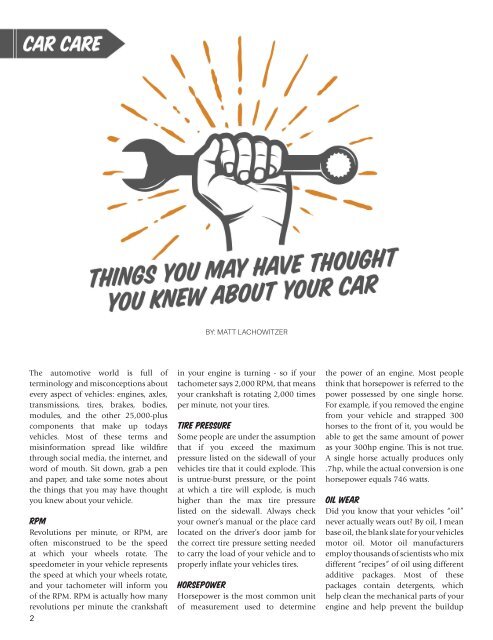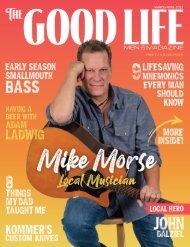The Good Life – January-February 2016
Featuring UFC Fighter, Timothy Johnson. 13-time X Games Medalist, Tucker Hibbert, Local Heroes - Fargo Vet Center and more in Fargo Moorhead’s only men’s magazine.
Featuring UFC Fighter, Timothy Johnson. 13-time X Games Medalist, Tucker Hibbert, Local Heroes - Fargo Vet Center and more in Fargo Moorhead’s only men’s magazine.
Create successful ePaper yourself
Turn your PDF publications into a flip-book with our unique Google optimized e-Paper software.
BY: MATT LACHOWITZER<br />
<strong>The</strong> automotive world is full of<br />
terminology and misconceptions about<br />
every aspect of vehicles: engines, axles,<br />
transmissions, tires, brakes, bodies,<br />
modules, and the other 25,000-plus<br />
components that make up todays<br />
vehicles. Most of these terms and<br />
misinformation spread like wildfire<br />
through social media, the internet, and<br />
word of mouth. Sit down, grab a pen<br />
and paper, and take some notes about<br />
the things that you may have thought<br />
you knew about your vehicle.<br />
RPM<br />
Revolutions per minute, or RPM, are<br />
often misconstrued to be the speed<br />
at which your wheels rotate. <strong>The</strong><br />
speedometer in your vehicle represents<br />
the speed at which your wheels rotate,<br />
and your tachometer will inform you<br />
of the RPM. RPM is actually how many<br />
revolutions per minute the crankshaft<br />
2<br />
in your engine is turning - so if your<br />
tachometer says 2,000 RPM, that means<br />
your crankshaft is rotating 2,000 times<br />
per minute, not your tires.<br />
Tire Pressure<br />
Some people are under the assumption<br />
that if you exceed the maximum<br />
pressure listed on the sidewall of your<br />
vehicles tire that it could explode. This<br />
is untrue-burst pressure, or the point<br />
at which a tire will explode, is much<br />
higher than the max tire pressure<br />
listed on the sidewall. Always check<br />
your owner’s manual or the place card<br />
located on the driver’s door jamb for<br />
the correct tire pressure setting needed<br />
to carry the load of your vehicle and to<br />
properly inflate your vehicles tires.<br />
Horsepower<br />
Horsepower is the most common unit<br />
of measurement used to determine<br />
the power of an engine. Most people<br />
think that horsepower is referred to the<br />
power possessed by one single horse.<br />
For example, if you removed the engine<br />
from your vehicle and strapped 300<br />
horses to the front of it, you would be<br />
able to get the same amount of power<br />
as your 300hp engine. This is not true.<br />
A single horse actually produces only<br />
.7hp, while the actual conversion is one<br />
horsepower equals 746 watts.<br />
Oil Wear<br />
Did you know that your vehicles “oil”<br />
never actually wears out? By oil, I mean<br />
base oil, the blank slate for your vehicles<br />
motor oil. Motor oil manufacturers<br />
employ thousands of scientists who mix<br />
different “recipes” of oil using different<br />
additive packages. Most of these<br />
packages contain detergents, which<br />
help clean the mechanical parts of your<br />
engine and help prevent the buildup


















